50,000 years of Australian History: a plea for interdisciplinarity
Professor Lynette Russell, Monash Indigenous Studies Centre, Monash University
The 2nd Bicentennial Australian History Lecture, hosted by the Department of History, the University of Sydney
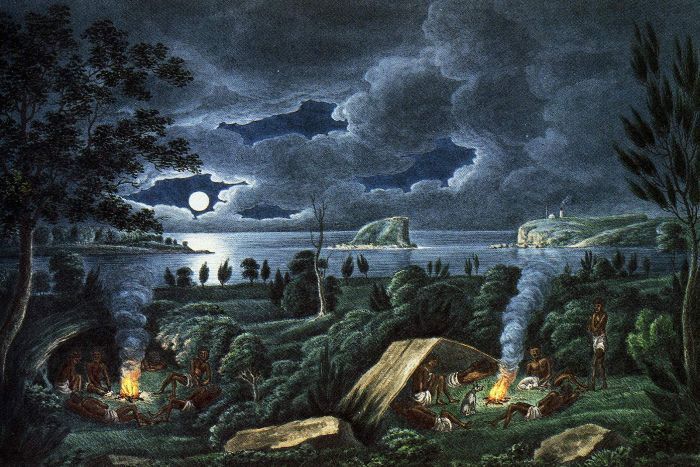
Joseph Lycett – Aborigines Resting by a Camp Fire near the Mouth of the Hunter River, Newcastle, NSW. (National Library of Australia)
How do we understand, imagine, visualise and create narratives for 50,000 years of Australian history?
As commonly presented, Australia’s past seems to consist of 230 years of European colonisation and over 50,000 years of Aboriginal culture, the former the purview of historians and the latter of archaeologists. Yet it presents striking opportunities for a truly integrated and seamless deep continental history, combining disciplines and methodologies.
Such a history would consider the full range of human experience from arrival, through changes in climate, technologies and belief systems to interactions with Maccassan, Portuguese, Dutch, French and finally the British. It would stretch across 2500 unbroken generations of people birthed, nurtured and sustained: people who modified landscapes, hunted, sang songs, practised religion and buried their dead.
This lecture argues for mixing epistemologies to create historical narratives of the deep past that may be taught in schools and universities, presented in museums and popular culture, and proudly shared by all Australians.
ABOUT THE SPEAKER
Professor Lynette Russell is Director of the Monash Indigenous Studies Centre, Monash University, and Node Director of the Australian Research Council’s Centre of Excellence in Australian Biodiverstiy and Heritage. She traces her Aboriginal ancestry via her grandmother from Western Victoria with connections into Tasmania and the Bass Strait islands; on the other side she is descended from transported convicts.
Lynette has a PhD in history from the University of Melbourne and has taught and researched in historical studies for over twenty years. In 2015 she was visiting fellow at All Souls College Oxford. Her monographs include: Hunt them, Hang Them: The Tasmanians in Port Phillip, 1841-1842 (2016); Roving Mariners: Aboriginal Whalers in the Southern Oceans 1790-1870 (2012); Appropriated Pasts: Archaeology and Indigenous People in Settler Colonies, coauthored with Ian McNiven (2005); A Little Bird Told Me (2002); and Savage Imaginings: Historical and Contemporary Representations of Australian Aboriginalities (2001). She is the current President of the Australian Historical Association.
The Bicentennial Australian History Lecture is a biennial public lecture hosted by the Department of History in the School of Philosophical and Historical Inquiry, University of Sydney. Distinguished historians offer engaged and critical perspectives on Australia’s past and the legacies of colonisation.
Date: Thursday 19 October, 2017
Time: 6 – 7.30pm
Please join us before the lecture for a reception in the Nicholson Museum at 5pm.
Venue: General Lecture Theatre, The Quadrangle, The University of Sydney. Venue location
Cost: Free and open to all with online registrations required
Register: here
Month: October 2017
NSW Premier’s History Prize Finalists and Winners
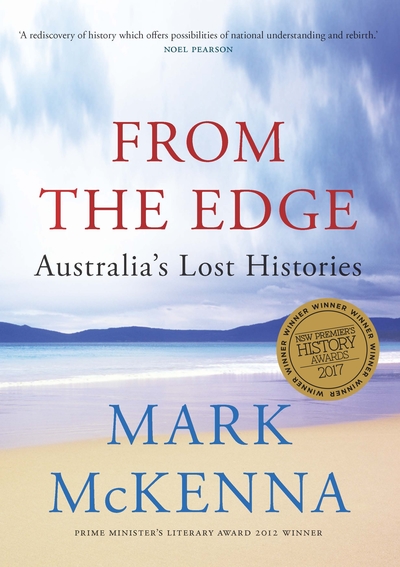
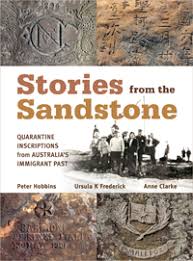
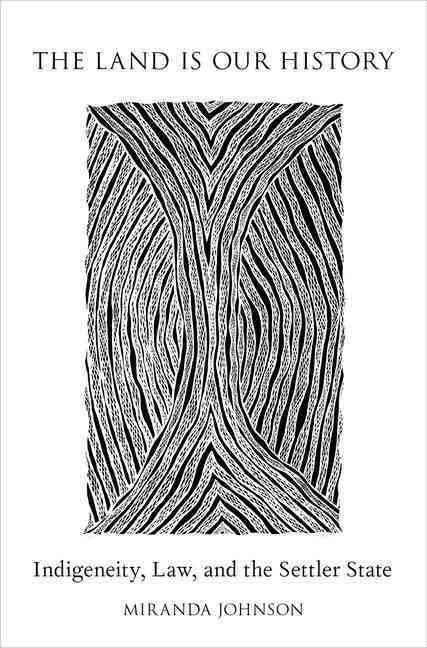
Many congratulations to Mark McKenna for winning the Australian History Prize for his book From the Edge: Australia’s Lost Histories
And to Peter Hobbins for winning with NSW Community and Regional History Prize with Annie Clark and Ursula Frederick for Stories from the Sandstone, the book that grew out of the Quarantine Station project.
The Department also congratulates Miranda Johnson, whose The Land Is Our History was one of the three finalists for the extremely competitive General History Prize.
It’s an honour for the Department to have been so well represented in the Premier’s Awards this year.
Chris Hilliard
Chair, Department of History

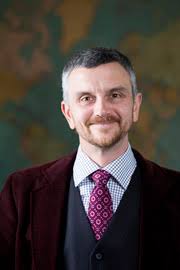

Former Student Steph Mawson Wins Prestigious Prizes
Steph Mawson, who did her Honours and MPhil degree with the department (winning numerous prizes, the University Convocation Medal, and co-founding the student journal History in the Making), has continued her award-winning ways with two articles that she wrote up from her MPhil research.
Steph’s article entitled “Convicts or Conquistadores?: Spanish Soldiers in the Seventeenth-Century Pacific,” published in the prestigious journal, Past & Present (232 [2016], pp. 87-125), won the Royal Historical Society’s (RHS) Alexander Prize.
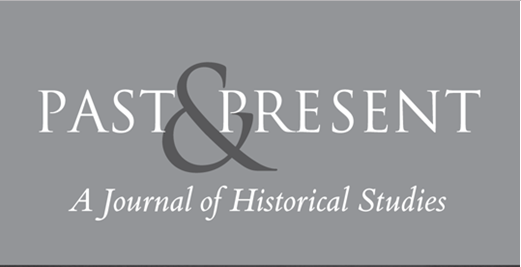
Named for L.C. Alexander, the founding secretary of the RHS who endowed the original award, the Alexander Prize “…is awarded for an essay or article based on original historical research, by a doctoral candidate or those recently awarded their doctorate, published in a journal or an edited collection of essays.” Prize winners receive a silver medal, two hundred and fifty pounds and an invitation to submit a further article for consideration by the editors of the RHS’ in house journal Transactions.
In awarding Stephanie the prize the judges remarked:
“This ambitious and important article examines the ragtag army which colonized the Spanish East Indies during the seventeenth century. Its deep archival research reveals ordinary soldiers to have been quite unlike their stereotypical depiction as conquistadores. They were a motley collection of criminals, vagrants and fugitives, many conscripted and mostly from New Spain, who seldom shared the spoils of conquest with their commanding officers. The author at once restores agency to these historical figures and displays its narrow limits. Mutiny and desertion were among the few pathways open to the conscripted and the mistreated. Such a small, impoverished and volatile force could not be relied upon to achieve Spain’s imperial ambitions, resulting in the recruitment of increasing numbers of indigenous troops. The article offers a compelling portrait of the early modern Philippines. Its intertwining of social and military history makes it distinctive among submissions dominated by intellectual history. Its success in ‘[h]umanising and complicating the face of imperialism’ invites historians of empire to take account of the conflicting interests and motives of the colonisers and their correspondingly diverse relationships to the colonised.”
For further information, see:http://pastandpresent.org.uk/congratulations-stephanie-mawson/
If that wasn’t enough, Steph also won the Dr. Robert F. Heizer Award for 2016 for another article she published in Ethnohistory, entitled “Philippine Indios in the Service of Empire: Indigenous Soldiers and Contingent Loyalty” (Vol. 63, No. 2 [2016], 381-413).
The award is given to the article that the committee believes exemplifies the best in Ethnohistorical research. The committee was impressed with the originality of the research, the strength of analysis, and the importance of its scholarly intervention.
For more on the award, please see: http://ethnohistory.org/index.php/awards-and-prizes/article-award/
Steph is now completing her PhD at Cambridge University.
Many congratulations to Steph!
Recent Completions
It’s time to congratulate a few more of our stellar postgrads.
Michael Warren, PhD
The examiners’ reports for Michael Warren’s doctoral thesis – Unsettled Settlers: Fear and White Victimhood in New South Wales and Van Diemen’s Land, 1788 – 1838 – have just come in. In what is undeniably a crowded field, Michael’s ‘outstanding’ thesis has been praised for its originality. In the words of one examiner: ‘In breaking new ground on matters of historical and current importance, and in providing a history of some of the deepest emotions arising from the colonisation of New South Wales and Van Diemen’s Land, [this thesis] deserves a wide audience’. Michael’s work has been deemed ‘worthy of publication’, both as a series of ‘journal articles’ or as a ‘book’. This is an extremely impressive result.
Billy Griffiths, PhD
The Department also congratulates Billy Griffiths on what his examiners agreed was a stunning PhD thesis. As Billy’s supervisor Iain McCalman notes: it’s difficult to choose from among the shower of plaudits from his examiners. Here is one of the best short summaries of Billy’s extraordinary achievement: “Deftly weaving together biography, history and literature, an immense variety of Australian landscapes and ecologies with the many and complex strands of archaeology, Griffiths brilliantly charts the history of modern Aboriginal archaeology in Australia, and how the continent’s astonishing deep time history was discovered. … it explores the ways these new understandings transformed and continue to transform national narratives and sensibilities – the remarkable shift from the ‘young’ nation, a footnote to empire, to a continent with an ancient heritage, the ‘oldest continuous culture in the world’; from a nation which for most of its modern history forgot or ignored Aboriginal people and their culture, to a country where people increasingly realise that ‘Beneath a surface veneer, the evidence of ancient Australia is everywhere’ (p.4), a pulsing presence.” The examiner concludes by suggesting that this could be ‘a landmark book’.
Rainald Roesch, MA
And warm congratulations to Rainald Roesch whose MA thesis on Queensland’s attempted annexation of New Guinea in 1883 has received high praise from both examiners. It’s encouraging to see Rainald’s years of hard work in both German and Australian archives acknowledged. As one examiner noted, ‘Roesch is clearly across the relevant peaks in political and community interest in both Australia and Germany on the question of New Guinea. He makes excellent use of both English and German language sources and offers some cogent modifications to the earlier historiography, particularly the work of Tampke and Hiery. Bringing together the German and Australian material clearly enriches the historiography of both fields’. Both examiners praised the thesis for the quality of its research and writing. Rainald’s primary supervisor was Judith Keene, until Mark McKenna took over this role.
Many congratulations to all three.
Frances Clarke, Postgraduate Coordinator
